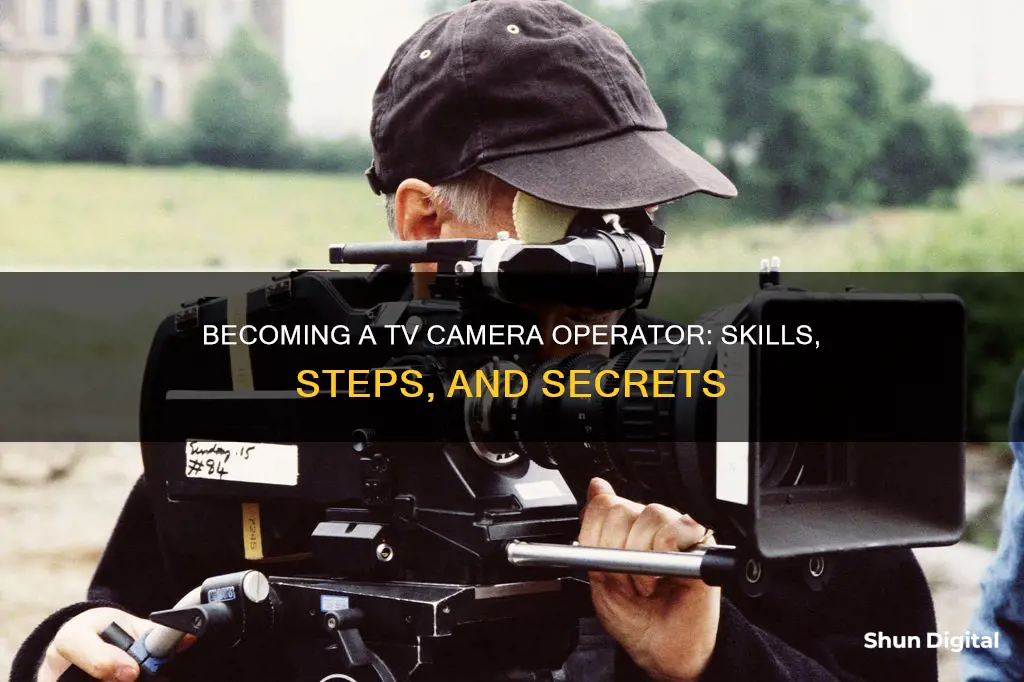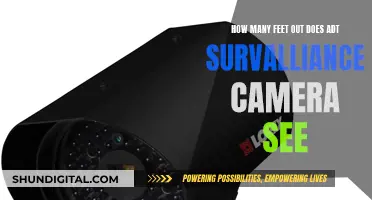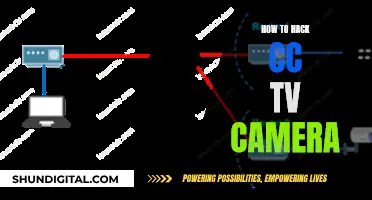
A TV camera operator is responsible for capturing the action, whether that's on location for a news programme or documentary, or on a large multi-camera studio show. They decide which cameras to use in different conditions and consider the composition, framing and movement of a shot.
To become a TV camera operator, you'll need a good understanding of camera equipment, as well as excellent communication and problem-solving skills. While there are no specific entry requirements, a relevant degree in film, television or video production is useful. You can also gain experience by working as a camera assistant or through an apprenticeship.
| Characteristics | Values |
|---|---|
| Education | No specific entry requirements, but a relevant tertiary qualification in film, television, or video production is useful. Useful secondary school subjects include English, maths, media studies, digital technologies, drama, and photography. |
| Experience | Working for a production company or having video or television work experience is useful. |
| Skills | Technical skills for operating film and video cameras, up-to-date knowledge of filming methods and equipment, knowledge of camera exposure, focus, colour, and lighting, and an understanding of the filming and editing process are all necessary. |
| Physical Requirements | Good level of fitness, as they stand for extended periods and carry heavy camera equipment. Good hearing and normal colour vision are also required. |
| Personal Qualities | Able to work well under pressure, good problem-solving skills, efficient and reliable, and good communicators with strong people skills. |
What You'll Learn
- Camera operators need to have technical skills for operating film and video cameras
- Camera operators need to have up-to-date knowledge of filming methods and equipment
- Camera operators need to be able to work well under pressure
- Camera operators need to have good communication skills
- Camera operators need to be able to work in a team

Camera operators need to have technical skills for operating film and video cameras
Camera operators are responsible for capturing images for film, television, commercials, and online content. They need to have a strong understanding of the technical aspects of camera operation, including the latest motion picture equipment, cameras, lenses, monitors, and lights.
To become a successful camera operator, it is essential to have technical skills in operating film and video cameras. This includes knowledge of camera exposure, focus, colour, and lighting. Understanding the filming and editing process is also crucial. Camera operators should be able to set up camera equipment, choose suitable lenses and camera angles, plan and rehearse shots, and follow camera scripts. They also need to be adept at repairing and maintaining camera equipment.
Camera operators must stay updated with the latest filming methods and equipment. They should be familiar with different camera lenses and know how to use equipment such as dollies, rigs, and cranes. Understanding the "exposure triangle" is vital, which involves adjusting settings like ISO, aperture, and shutter speed to achieve proper exposure. Additionally, operators should know the difference between shooting on digital versus film and how these choices impact the final output.
Camera operators also need to develop skills related to lighting and its impact on shots. They must understand how to use lighting equipment and how different lighting conditions affect the overall scene. This knowledge is essential for capturing high-quality images and ensuring the desired tone and intention of each shot.
Furthermore, camera operators should possess strong communication and collaboration skills. They need to work closely with directors, cinematographers, and other crew members to ensure that the artistic and technical aspects of the production align. Effective communication ensures that the camera operator can capture the vision of the director and bring it to life through the viewfinder.
Simplisafe Camera and Fire TV: Can They Sync?
You may want to see also

Camera operators need to have up-to-date knowledge of filming methods and equipment
Camera operators need to have an in-depth understanding of the latest motion picture equipment, cameras, lenses, monitors, and lights. They must be able to work with digital and film cameras, as well as other equipment such as dollies, rigs, and cranes. Camera operators are responsible for setting up and operating this equipment to capture images and events for television, movies, and videos.
To gain this knowledge, aspiring camera operators can take university courses in media production, media technology, or photography. These courses can provide practical and work experience opportunities, such as internships or placements, which can be advantageous when looking for work. Short courses and apprenticeships are also available in this field.
Additionally, camera operators should stay up-to-date with the latest filming methods and equipment by studying relevant books, tutorials, and how-to videos. They should have a good understanding of camera exposure, focus, colour, and lighting, as well as the ability to adjust settings like ISO, aperture, and shutter speed to achieve proper exposure.
Furthermore, camera operators should be familiar with the differences between shooting on digital versus film and understand how different camera angles and movements can enhance the tone and intention of a shot. Lighting is another crucial aspect, as operators need to know how lighting affects the shots within any scene.
Fire TV's Camera: Active Even When Idle
You may want to see also

Camera operators need to be able to work well under pressure
Working as a camera operator can be stressful and high-pressure. It is a very active role, with shooting days lasting more than 10 hours. Camera operators need to be able to work well under pressure and have excellent concentration skills to be able to maintain their focus over long programme shoots. They must be able to stay calm and make quick decisions when things don't go according to plan.
Camera operators are often the only ones on set who see how everything is being shot in real-time. They have to be able to correct and adjust anything that doesn't match the director or DP's vision. They also need to be able to work well with others and have good communication skills, as they are in constant communication with the production designer, gaffer, and others on set. They must be able to take direction from the director and work as part of a team with other crew and production staff.
Camera operators also need to be flexible and open to change. They must be able to adapt to different shooting styles and work in a variety of conditions and environments, both indoors and outdoors. They may need to work evenings and weekends and be on call, and they may spend nights away from home.
In addition to these skills, camera operators need to have an in-depth understanding of camera equipment and technical knowledge of the latest motion picture equipment, cameras, lenses, monitors, and lights. They need to know how to use equipment such as dollies, rigs, and cranes and understand the essentials of the "exposure triangle," including adjusting settings such as a camera's ISO, aperture, and shutter speed.
Stop Neighbors Spying: Block Their Camera Views
You may want to see also

Camera operators need to have good communication skills
Camera operators also need to be able to communicate well with the people they are filming. On multi-camera productions, they may talk to presenters to get the best picture composition. They also need to be able to take criticism and work well under pressure.
Camera operators are often the only person on set who sees how everything is being shot in the moment. They have to be able to correct and adjust anything that doesn't match the director's vision. Therefore, they need to be able to communicate these changes to the director and the rest of the crew.
Good communication skills are also important for networking and building relationships with people in the industry. This can help camera operators find work, as most jobs are found through networking and personal connections.
Plot Watcher Game Cameras: What You Need to Know
You may want to see also

Camera operators need to be able to work in a team
On multi-camera productions, camera operators work as part of a team, each covering the action from different angles. They respond to instructions from the director, who is in charge of the overall vision for the shoot, and work with grips and gaffers to set up equipment. Camera operators also work closely with the production designer, gaffer, and other crew members. They may also supervise a group of camera assistants, who carry out tasks such as loading film stock and handling equipment.
Camera operators must be able to take direction and work collaboratively to ensure that their work aligns with the director's vision. They need to be flexible and open to change, as well as being able to accept criticism and work well in a high-pressure environment.
In addition to their technical skills, camera operators need strong interpersonal and communication skills to interact effectively with their colleagues and employers. They must be able to build good working relationships and work as part of a cohesive team to achieve the desired results.
Smart TV and Lorex Cameras: Seamless Viewing Experience
You may want to see also
Frequently asked questions
There are no specific entry requirements to become a TV camera operator. However, a relevant tertiary qualification in film, television or video production is useful. Relevant courses include degrees in media production, media technology or photography.
TV camera operators need to have technical skills for operating film and video cameras, up-to-date knowledge of filming methods and equipment, and knowledge of camera exposure, focus, colour and lighting. They also need to be able to work well under pressure, have good problem-solving skills, and be efficient and reliable.
As of November 2022, the salary range for a camera operator is between $71,964 and $108,186 per year. On average, a camera operator's salary is around $86,598 per year. Pay rates vary depending on experience and the type of production.







